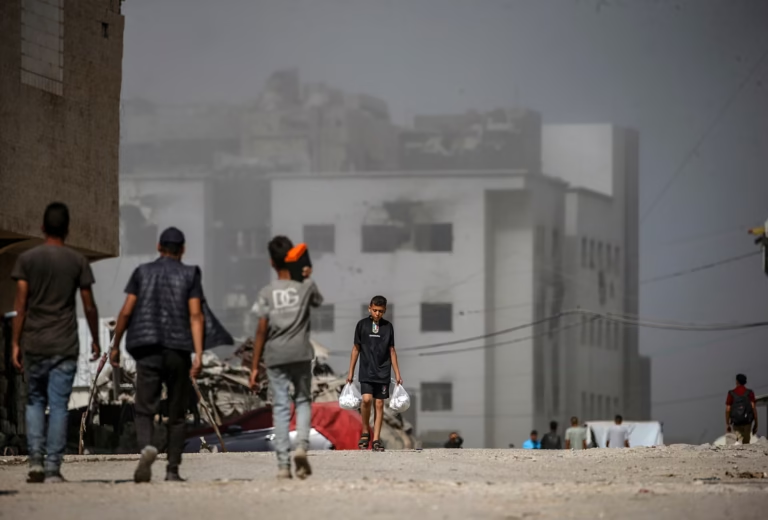President Donald Trump said a ceasefire agreement in Gaza could soon be reached as his envoys traveled to Egypt for high-level negotiations. The White House confirmed on Saturday that Jared Kushner and Steve Witkoff would represent the United States in Cairo to finalize details of a hostage release and discuss steps toward ending the two-year war.
The announcement came a day after Hamas signaled willingness to release hostages under Trump’s peace plan. In an interview, the president said, “We are very close,” adding that he hoped to push all sides toward a final deal within days. Egypt’s foreign ministry said delegations from Israel and Hamas would also attend meetings in Cairo on Monday. The discussions are expected to focus on the exchange of Israeli hostages for Palestinian prisoners and on security measures to support a lasting ceasefire.
Despite the diplomatic push, violence continued on the ground. Local officials reported that Israeli strikes killed scores of Palestinians on Saturday. The Palestinian news agency Wafa said at least 17 people, mostly women and children, died when Israeli warplanes hit a home in the al-Tuffah neighborhood of Gaza City. Another 20 were reported missing under the rubble, while dozens were injured.
Earlier in the day, Israeli drones attacked a crowd near a bakery in central Gaza City, killing dozens, according to Wafa. Additional strikes on a house in Gaza City and a tent sheltering displaced families in al-Mawasi, an area previously designated as a safe zone, left six more civilians dead, including two children. Hamas condemned the attacks, saying they showed that Israeli Prime Minister Benjamin Netanyahu was not reducing military operations against civilians as claimed.
Israeli army radio said operations in Gaza were being reduced to the minimum, with strikes described as defensive. Trump had earlier posted on Truth Social that he appreciated Israel’s temporary halt to bombings but warned Hamas against stalling in the talks. He wrote that he would “not tolerate delay” and urged Hamas to move quickly, or “all bets will be off.”
In a televised address, Netanyahu expressed hope that hostages would return home soon, possibly during the Jewish festival of Sukkot, which begins Monday. He declared that Hamas would be disarmed, either through Trump’s diplomatic plan or by Israeli military action. Hamas welcomed parts of Trump’s 20-point peace plan on Friday, including a ceasefire, Israel’s withdrawal, and the release of captives on both sides. However, the group left open key issues such as whether it would disarm, a central demand of Israel.
Trump later stated that Israel had agreed to an initial withdrawal line, which had been shared with Hamas. He explained that once Hamas accepted the arrangement, a ceasefire would begin, followed by the exchange of hostages and prisoners. The president did not specify details of the proposed withdrawal. Speaking to Axios, Trump insisted that momentum was building. He said Israeli and Hamas leaders had responded positively, while international support for his plan was widespread. “Every country of the world in favor. Bibi is in favor. Hamas went a long way – they want to do it. Now we will need to close it,” Trump said.
Trump also praised Turkish President Recep Tayyip Erdoğan for his role in pressing Hamas toward compromise. He described Erdoğan as “a tough guy, but a friend of mine,” crediting him with helping secure agreement on hostages. The president added that he wanted to restore Israel’s global reputation, which had been damaged by the high civilian death toll in Gaza. Local health officials estimate that at least 67,074 Palestinians have been killed, with around 170,000 wounded. Thousands more remain missing under rubble or dead from the indirect consequences of the war.
International bodies, including a United Nations commission and a leading genocide research group, have concluded that Israel committed genocide in Gaza. Israel strongly rejects the accusations, arguing that it acted in self-defense against Hamas. Trump said he aimed to help rebuild international support for Israel while also ensuring the conflict comes to an end. “Bibi took it very far and Israel lost a lot of support in the world. Now I am gonna get all that support back,” he said.
As talks in Cairo begin, global attention is fixed on whether negotiations can deliver both an immediate ceasefire and a framework for peace. For families of hostages and civilians trapped in Gaza, the outcome could mean the difference between more destruction and a long-awaited path toward stability.







